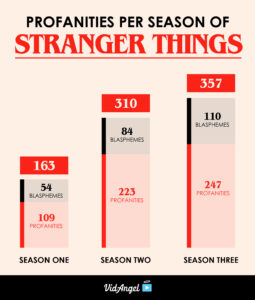- Because Our Children Are Watching
- Join the Cause
- Donate
Written by PTC | Published July 9, 2019

LOS ANGELES (July 9, 2019) – The Parents Television Council is warning parents about the increased profanity found in Netflix’s Stranger Things, which according to new VidAngel data, has gotten more explicit in the new Season 3 as compared to the first two seasons of the series.
“The entertainment world is abuzz over the newest season of the popular Netflix series, Stranger Things. Although the program is rated TV-14, parents should be aware of the spike in adult content, especially profanity on the program. According to the content filtering provider VidAngel, there were 357 profanities during Season 3 of the show, compared to 310 profanities in Season 2, and 163 profanities in the first season,” said PTC President Tim Winter.
“It is unfortunate, but all-too-familiar in Hollywood today, that the creative community believes explicit content must be ratcheted up for each successive season in order to remain entertaining. Given that this particular show is centered on young characters, and given its content rating, it is very likely that children are consuming it in huge numbers. Netflix should reconsider the teen content rating, and parents need to be aware of just how graphic this show has become.
“Actress Evan Rachel Wood recently expressed her concern that violent and abusive relationships depicted in the new season of Stranger Things might be normalized by the show. Despite vicious blowback, she has boldly – and rightly – called for increased public awareness about such depictions and their real-life consequences.
“The only way that families can enjoy a growing volume of content on platforms like Netflix is via content filtering services like VidAngel, which allows parents to filter out unwanted profanity and other explicit material in programming like Stranger Things. Ironically, and indeed sadly, major forces in Hollywood are attempting to kill such filtering services, despite the fact that filtering opens up an entire new marketplace for movies and TV shows.
“Parents should be given more filtering resources so that they can make better, more informed entertainment media decisions for their families.”